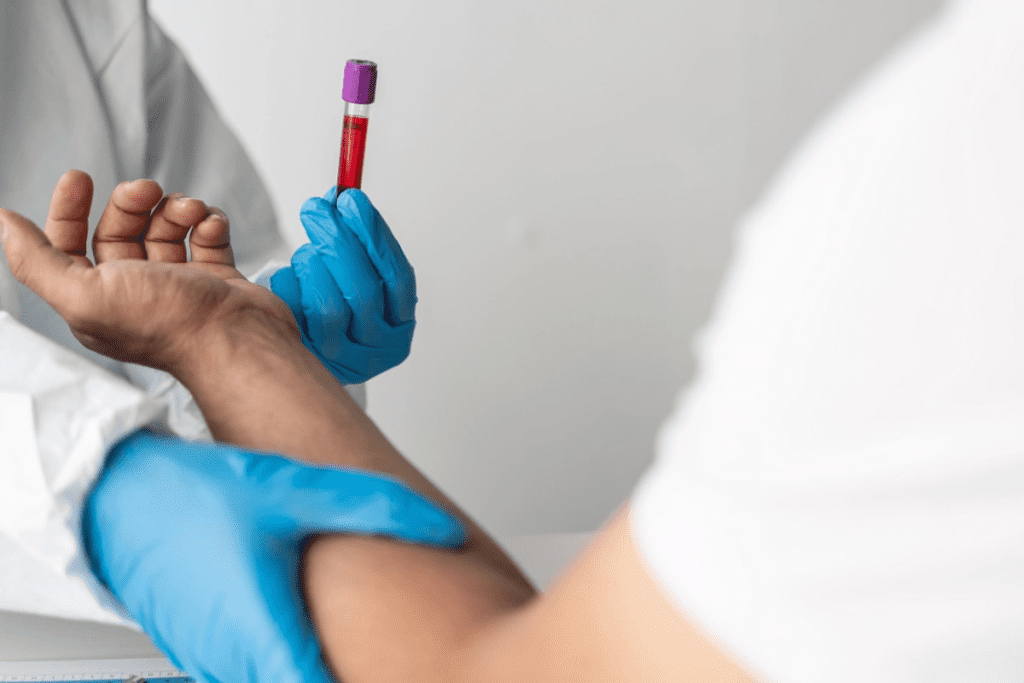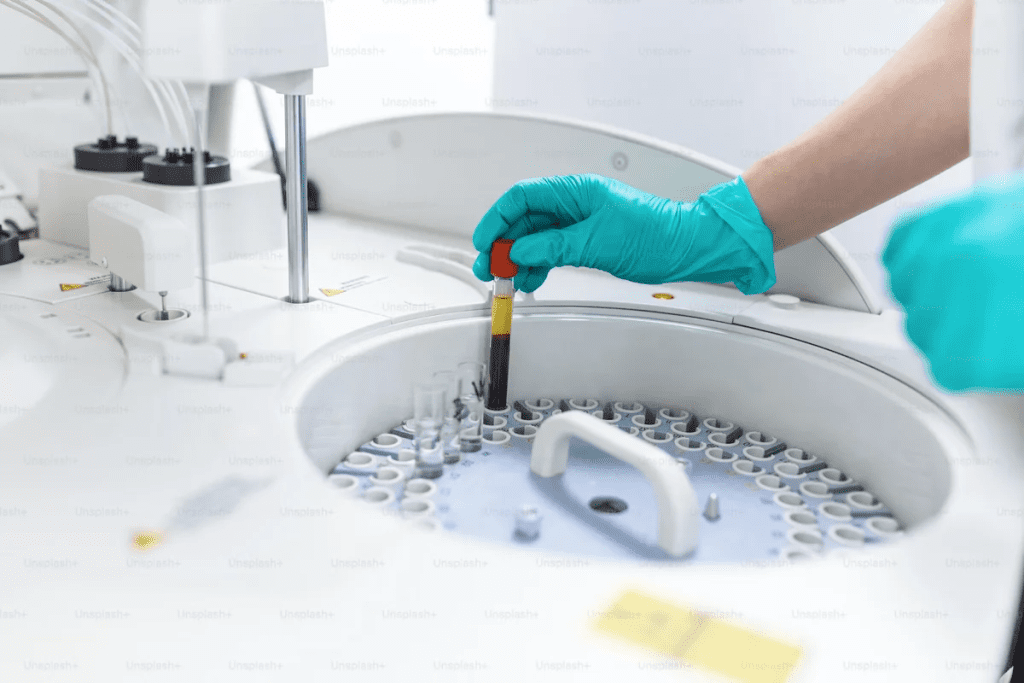Last Updated on November 14, 2025 by

We often hear about blood disorders, but do we know who specializes in treating them? A hematologist is a medical specialist. They diagnose and treat disorders related to the blood, bone marrow, and lymphatic system.
A hematologist, as the American College of Physicians says, manages diseases that affect the blood. This includes anemia, clotting disorders, leukemia, lymphoma, and myeloma. These conditions can be benign or malignant and need specialized care.
By understanding the role of a hematologist, we can see how vital their work is. They help manage blood-related disorders and ensure our blood functions properly.

Hematologists are doctors who deal with blood and blood-related issues. They help with problems in the blood, bone marrow, and lymphatic system. Their work is vital for our health.
Hematology is the study of blood and its disorders. Hematologists are highly trained physicians who treat blood diseases. This includes bleeding disorders, blood clotting issues, and blood cancers.
Hematology is about studying blood and treating its disorders. Hematologists can handle many blood-related problems. This includes anemia, bleeding disorders, and blood cancers like leukemia and lymphoma.
Hematology is connected to oncology and immunology. This is because blood is key to our health. Advanced training in hematology helps these specialists care for complex blood disorders.
To be a hematologist, one needs a lot of education and training. They are usually internal medicine doctors or pediatricians. They get extra training in hematology through a fellowship program.
Getting to be a hematologist takes at least nine years after medical school. This includes residency and fellowship training. This training prepares them to handle complex blood disorders.
Hematologists focus on blood and blood-forming organs. Oncologists treat blood cancers, too, but hematologists handle all blood disorders. This makes them unique.
It’s important to know the difference between hematologists and other specialists. For example, someone with hemophilia needs a hematologist’s care. This ensures they get the right treatment.
Understanding blood disorders is key to managing them well. Hematologists lead this effort. These disorders can greatly affect a person’s life, so getting the right care is important.
Anemia means not enough red blood cells to carry oxygen. It can be caused by iron or vitamin deficiency, or chronic diseases. Iron deficiency anemia is the most common, treated with iron and diet changes.
Hematologists help find the cause of anemia and create a treatment plan. They test for iron, vitamin B12, and more to figure out the cause.
Hemophilia makes it hard for the body to clot, leading to long or uncontrolled bleeding. It’s inherited and affects joints or muscles. Hematologists manage hemophilia and similar disorders like von Willebrand disease.
Treatment often involves clotting factor infusions. Advances in treatment have greatly improved life for those with hemophilia, helping them stay active.
Platelet disorders, like low or high platelet counts, can cause bleeding or clotting. Hematologists diagnose and manage these, working with patients to monitor counts and adjust treatments.
They use medicines to boost or lower platelet counts. Sometimes, platelet transfusions are needed.

Hematologists are key in finding and treating blood cancers. They help manage diseases of the blood, bone marrow, and lymphatic system.
Leukemia is the top blood cancer in the U.S., hitting kids and teens hard. It happens when the bone marrow makes bad white blood cells. There are many types, like ALL and AML.
Signs include feeling tired, losing weight, getting sick often, and bruising easily.
Lymphoma affects the immune system’s lymphatic system. It has two main types: Hodgkin’s and Non-Hodgkin’s. Hodgkin’s has Reed-Sternberg cells, while Non-Hodgkin’s doesn’t.
Symptoms include swollen lymph nodes, fever, night sweats, and weight loss. Early diagnosis is key to good treatment.
Multiple myeloma is a cancer of plasma cells in the bone marrow. It causes anemia, bone pain, and infections. Disorders like MGUS and solitary plasmacytoma are related.
Monitoring and early action are vital for managing these conditions.
Myelodysplastic syndromes (MDS) are disorders with poorly formed blood cells. They cause anemia, infections, and bleeding. MDS can turn into AML.
Treatment depends on the MDS type and risk level.
Seeing a hematologist for the first time is a big step. It’s a chance to get your blood health checked. You’ll get a full check-up to find out what’s causing your symptoms.
Your hematologist will start by asking about your health history and symptoms. They’ll also ask about your current medications. Then, they’ll order specialized blood tests to find out what’s wrong.
These tests might include a complete blood count (CBC) or a blood smear. Your hematologist will explain the test results to you. They’ll tell you what they mean and what you might need to do next.
Sometimes, a bone marrow biopsy is needed to diagnose blood disorders or cancers. This test takes a small sample of bone marrow. Your hematologist will explain why you need it, what it involves, and what to expect after.
Once your condition is diagnosed, your hematologist will create a treatment plan just for you. This might include medication, lifestyle changes, or other treatments. They’ll also set up a follow-up schedule to check on your progress and adjust the plan if needed.
To get ready for your first hematologist visit, follow these steps:
Knowing what to expect at your first hematologist appointment can make you feel more ready. It’s a big step towards taking care of your health.
The need for hematologists in the U.S. is growing fast. This is because more people are getting older and cancer cases are increasing. The healthcare system is struggling to keep up with this demand.
Recent numbers show a big problem: the need for hematologists and oncologists will jump by 40% by 2025. But the number of specialists will only go up by 25%. This means there could be over 2,200 fewer specialists by 2025.
The gap between the number of hematologists and the demand is huge. Let’s look at the numbers:
With more people needing hematologists and fewer available, patients might find it hard to get the care they need. Here are some tips to help:
By knowing the current situation and using the resources available, patients can find ways to get the care they need despite the shortage of hematologists.
Hematology is key in modern medicine. It offers vital care for those with blood issues and cancers. Hematologists are vital in diagnosing and treating blood-related problems. This improves patients’ lives and outcomes.
Hematologists focus on blood diseases like anemia and blood cancers. Their knowledge helps advance medical science. It also improves how we care for patients.
The need for hematologists is growing in the U.S. As the field grows, hematologists will lead in finding new treatments. They will also provide caring support to those with complex blood disorders.
A hematologist is a doctor who deals with blood-related problems. They treat both simple and serious issues. This includes blood clots and disorders that cause too much bleeding.
Hematologists handle many diseases related to blood cells. They treat anemia, bleeding disorders like hemophilia, and platelet problems. They also deal with blood cancers like leukemia and lymphoma.
You might need to see a hematologist if you have unexplained bleeding or bruising. Fatigue or frequent infections are also signs. Your doctor might send you to a hematologist if they think you have a blood disorder.
At your first visit, the hematologist will ask about your health history. They will also do a physical check-up. They might order tests like blood tests or a bone marrow biopsy.
Hematology is the study of blood and blood-related diseases. It includes bone marrow and blood disorders.
Hematologists focus on blood disorders, including blood cancers. Oncologists deal with cancer in general. Hematologists often work with oncologists to care for blood cancer patients.
The need for hematologists is increasing. This is because more people are getting older and more blood disorders are happening. Advances in treatments also require specialized care.
If there’s a shortage, look for care at cancer centers. You can also use digital tools to find specialists.
Hematologists study for at least 9 years. This includes residency and fellowship training. They become very skilled in their field.
Hematologists are key in treating blood cancers. They work with oncologists to give complete care. This includes diagnosing and treating diseases like leukemia and lymphoma.
Subscribe to our e-newsletter to stay informed about the latest innovations in the world of health and exclusive offers!